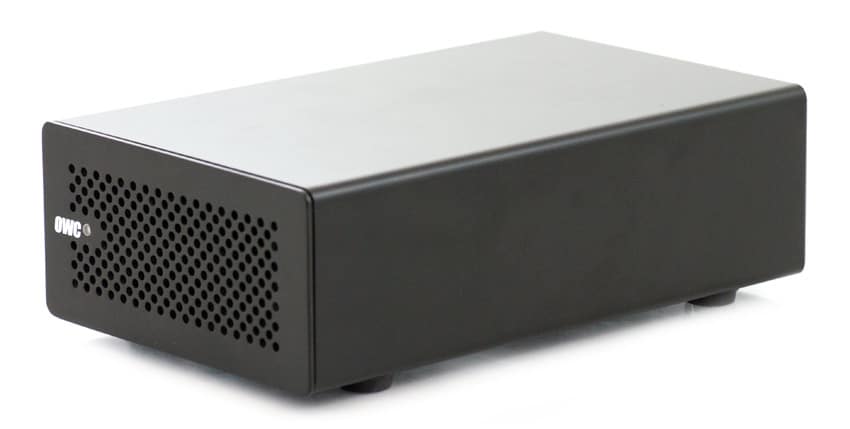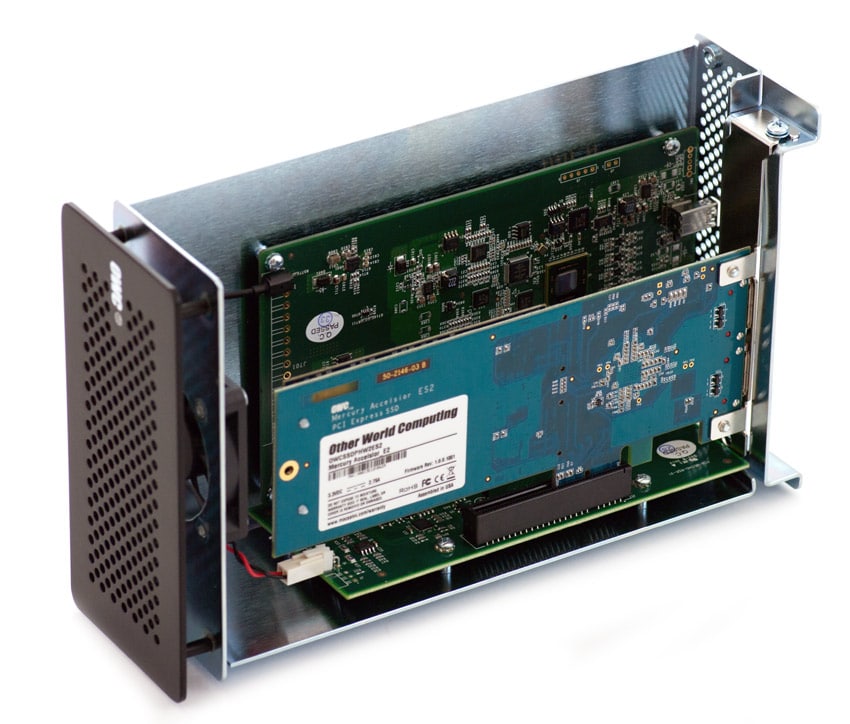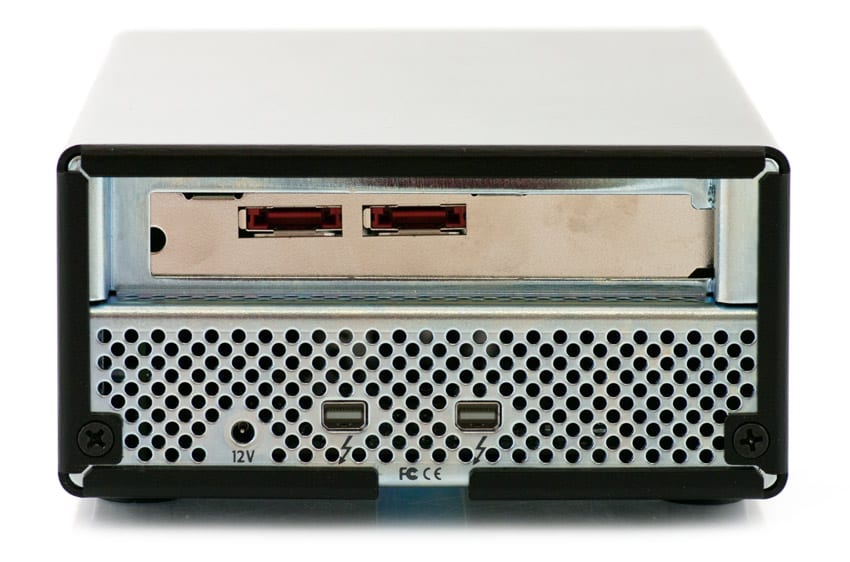
The OWC Mercury Helios is a PCIe enclosure that supports one half-length, full-height PCIe card, interfaces via Thunderbolt and is designed as a notebook companion for creative professionals who need robust performance for their workstation or even on-the-go. With this design incorporating Thunderbolt, OWC is targeting users who have typically found themselves relegated to their desktop workstation for applications that require a PCIe port. The Helios removes this barrier and is lightweight enough at just 2.4 pounds and has small enough dimensions to make it simple to pack up and tote along for business. OWC sells the enclosure bare or with a range of capacities from their OWC Mercury Accelsior E2 PCIe SSD. We recently reviewed the first Mercury Accelsior, but with the new Accelsior E2, OWC added two 6Gb/s eSATA ports on top of the same performance the first Accelsior provided.

While users can expect the highest-end performance they could possibly achieve with an external SSD through the Helios, its applications also span a much wider range than just speedy storage. Creatives might want to use the enclosure to use as scratch space for video and audio editing environments, and the design is small enough and portable enough to be shared amongst several computers very easily. While Helios doesn’t support every PCIe card on the market, it does support a solid range of them, covering the core prosumer offerings. Additionally, the Helios has two Thunderbolt ports on the back of the device that enable it be part of a Thunderbolt daisy-chain. This increases its functionality by enabling users to link up their other Thunderbolt devices.
The base OWC Mercury Helios enclosure without a PCIe SSD has an MSRP of $379.99. Users can also buy the enclosure packaged with OWC’s Mercury Accelsior E2 PCIe SSD which is available in 120GB, 240GB, 480GB and 960GB capacities. Pricing for the paired offering is $629.99, $794.99, $1049.99 and $1599.99 respectively. The OWC Mercury Helios enclosure also includes a 3 year warranty with a 48-hour turnaround time.
OWC Mercury Helios Specifications
- PCIe cards supported: One half-length (up to 6.5″ long), single width, full-height PCIe card
- Expansion slot: One PCIe 2.0 x8 (x4 mode)
- Port Configuration: Thunderbolt – (2) 20 pin port
- Max Data Transfer Rate: Thunderbolt – 10Gbit/s (or 1250MB/sec)
- Port Bootability: Bootable as long as the specific PCIe card installed is bootable
- Macintosh System Requirements
- Mac OS X 10.6.8 or later. Including ‘Lion’ 10.7.x, and ‘Mountain Lion’ 10.8.x
- Available Thunderbolt port.
- Dimensions (WxDxH) 5.7 in (114.78mm) x 8.8 in (223.52mm) x 2.9 in (73.66mm)
- Weight (without card): Approximately 2.4 pounds (1.08kg)
Design and Build
The construction of the OWC Mercury Helios is centered on a black, all-metal enclosure. The Helios really feels solid and could stand up to bumps and jolts that it may experience in transport. This is necessary as it’s an extremely portable enclosure designed often to be paired with notebook computers for performance on-the-go. The enclosure does pick up fingerprints fairly easily, but the color helps to hide them and serves to help the Helios blend in with most environments.
The front of the OWC Mercury Helios features a small LED indicator light and OWC branding as well as a heavily ventilated grille. The sides of the enclosure are feature-less. The bottom is wholly ventilated. Moving to the rear of the unit, there are two Thunderbolt ports and the power port. The upper portion has an open slot for the PCIe card. Rounding out the exterior, four feet on the bottom of the Helios provide friction to keep it from sliding around, and there are also standard model labels on the bottom.
The black metal enclosure is actually a unibody piece that wraps around the silver internal metal construction to which the circuit boards and fan are attached. OWC has left some space between the fan and the exterior for proper ventilation. To remove the exterior shell, users need to remove four screws – two from the back and then two from the bottom. Having done that, users can just push out the inner chassis with their fingers. Installing a PCIe card requires the removal of another screw holding in the PCIe bracket. Users can then insert the card, replace the five screws, and then they can plug in the power and Thunderbolt cables. OWC notes that the Helios will only power if it has DC power and an active Thunderbolt signal. From here, the Helios is good to go since it doesn’t require any drivers, although users should check to ensure that their PCIe card doesn’t require a driver.
Performance
We utilized our Consumer Testing Platform to measure transfer speeds from two different PCIe cards inside the OWC Mercury Helios using its Thunderbolt interface. First, we tested the Mercury Accelsior PCIe SSD. We started with 2MB sequential read and write testing in which the Accelsior came in at 656.74MB/s and 593.06MB/s respectively, while random large-block transfers measured 608.87MB/s read and 303.88MB/s write. Then we removed the Accelsior card and installed the OCZ RevoDrive 3 X2. Again, we started with 2MB sequential read and write testing and the RevoDrive 3 X2 came in at 829.04MB/s and 727.67MB/s respectively, and random large-block transfers measured 832.68MB/s read and 688.84MB/s write. Overall, both drives delivered a robust amount of throughput, though neither drive saturated the Thunderbolt interface. Also noteworthy, the performance of the OCZ RevoDrive 3 X2 inside the Helios was limited as there is one lane of PCIe versus 4 lanes when installed inside of a workstation computer. When we tested in that environment, it ranged more from 1,150-1,190MB.
Conclusion
The OWC Mercury Helios PCIe enclosure provides users with an option to add a PCIe card via Thunderbolt to their system. While it could be used in desktop scenarios, users are also able to be untethered with new access to PCIe cards from notebooks because of the Helios’ portable design which has less length than an iPad and roughly two-thirds the width and because the unit also features two Thunderbolt ports. Those ports enable high-performance transfer rates and daisy-chaining capabilities. Also, since the Helios supports half-length, full-height PCIe cards, it can handle just about any PCIe card currently on the market.
The enclosure that OWC employs for the Helios adds value. Ventilation in the right areas, a sturdy metal construction and active cooling via the included fan mean that users won’t have to worry about heat issues. Additionally, the rigid unibody exterior that wraps around the metal interior ensures that the PCIe card and PCB won’t suffer any damage while the device is in transit. It’s also very easy to access the card in case of maintenance or upgrades.
When we tested the Helios, we installed two PCIe cards: OWC’s own Mercury Accelsior E2 as well as OCZ’s RevoDrive 3 X2. We used our consumer testing platform and performed 2MB sequential and random transfer testing. Overall, both consumer-focused cards delivered plenty of performance to satisfy most users’ needs, though neither was able to reach the approximate 1GB/s Thunderbolt limit. Additionally, as we noted above, the Helios offers 1 lane of PCIe versus 4 in a workstation computer which can limit performance.
Pros
- Compatible with most PCIe cards
- Simple PCIe card installation
Cons
- Thunderbolt cable not included
Bottom Line
The OWC Mercury Helios is a highly portable PCIe expansion enclosure that enables notebook users to achieve robust performance typically reserved for desktop workstations.


